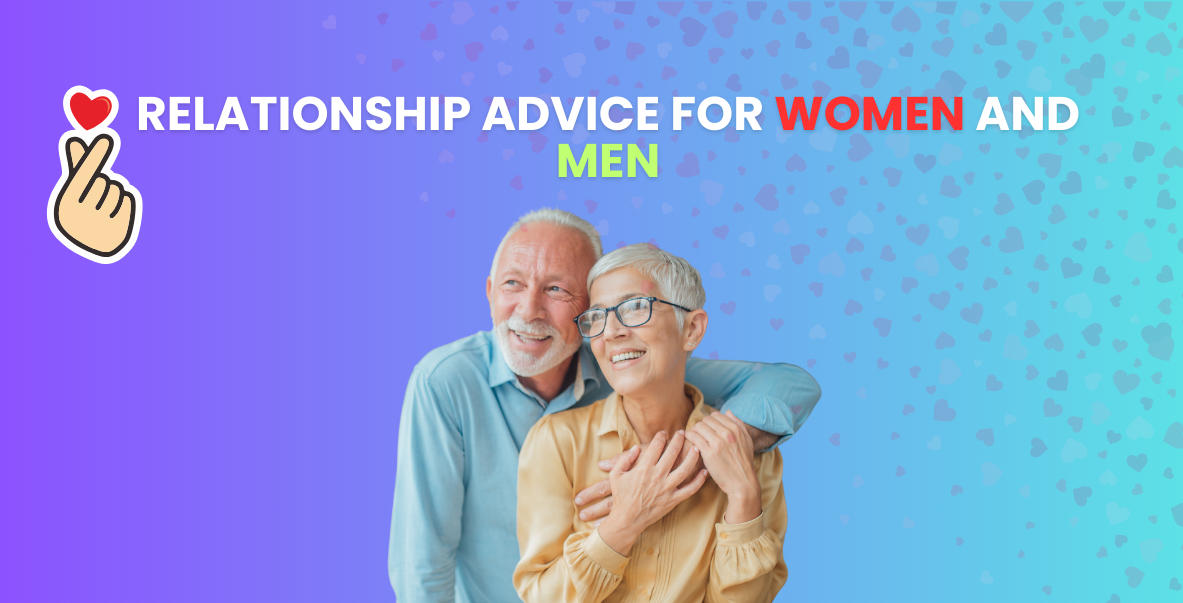Dating News
How to Deal with Ghosting: Expert Tips & Strategies
Learn how to deal with ghosting effectively. Get proven tips on emotional recovery and rebuilding confidence today!
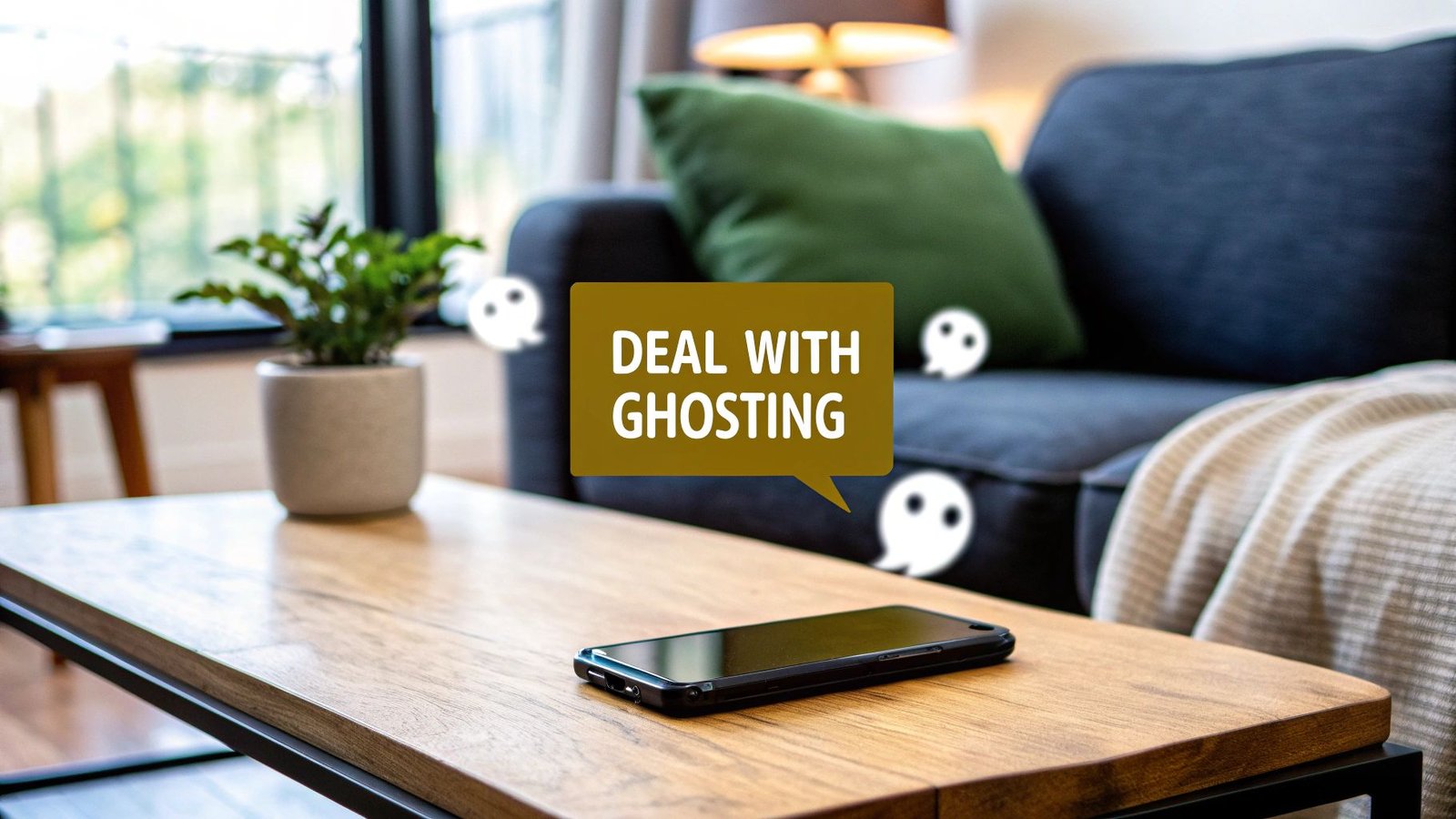
Understanding Why People Ghost and What It Says About Them
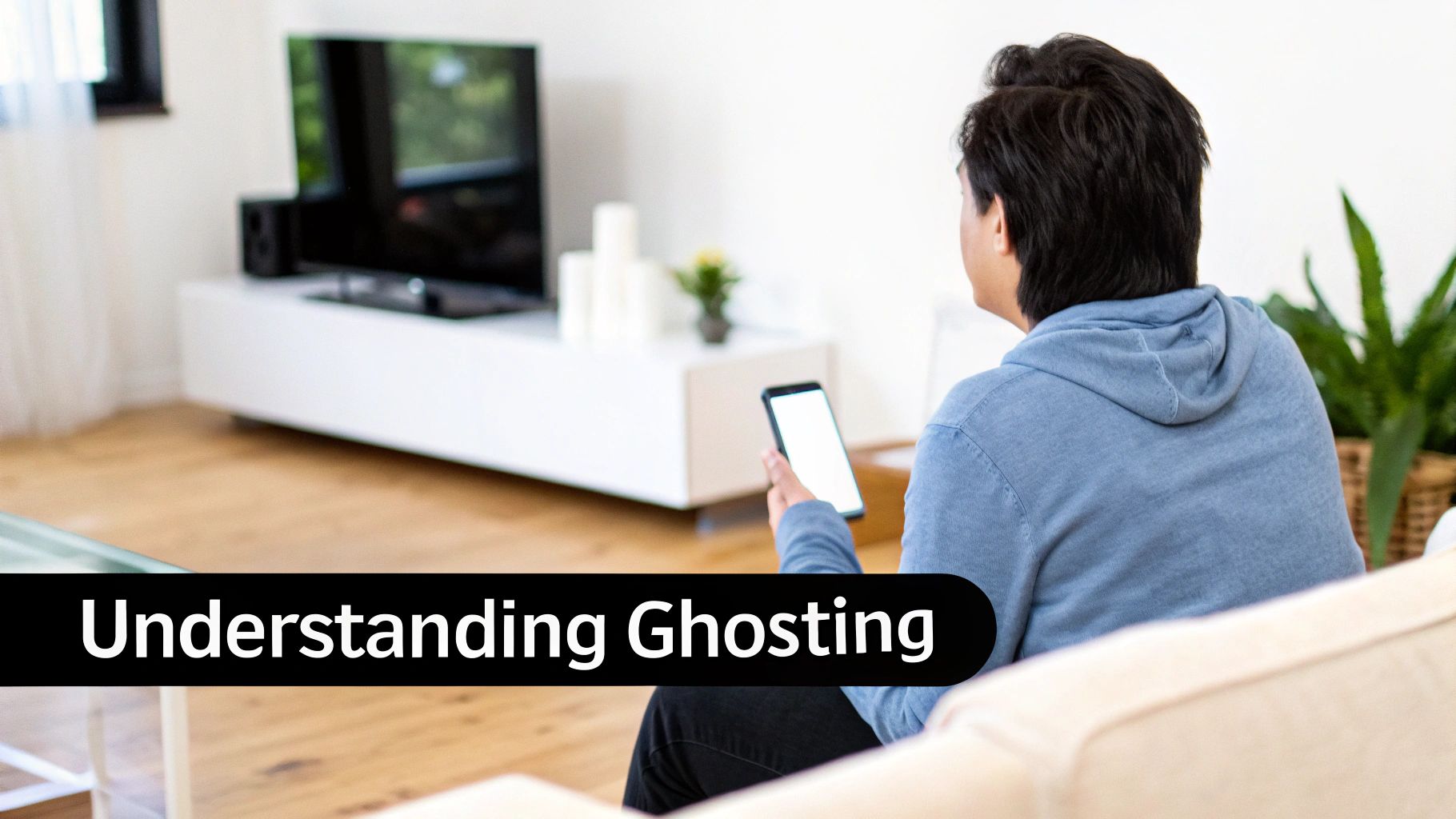
It’s the question that echoes long after the messages stop: why? When you’re faced with the deafening silence of being ghosted, your mind can race for an explanation, often landing squarely on self-blame. But the difficult truth is that someone’s choice to disappear is almost always a reflection of their own world, not a verdict on your worth.
Realising this is the first proper step in figuring out how to deal with ghosting and protecting your emotional well-being. People who ghost are often driven by powerful, though poorly managed, internal factors. Their behaviour isn't a sign of strength or superiority; it’s usually the opposite. It shines a light on their own limitations and inability to handle difficult feelings or conversations in a mature way.
The Psychology Behind the Disappearance
So, what’s really going on in the mind of someone who ghosts? While every situation has its own nuances, the reasons often boil down to a few common psychological patterns. Getting to grips with these can help you depersonalise the experience and see it for what it is: their issue, not your failing.
Common motivations often include:
- A deep-seated fear of confrontation: Many people find direct, honest conversations incredibly uncomfortable. Ghosting becomes the path of least resistance, allowing them to dodge the anxiety of a breakup chat, potential arguments, or having to witness someone else’s hurt.
- Emotional immaturity: Some individuals simply haven't developed the skills to end a connection respectfully. They lack the emotional toolkit to communicate their feelings clearly and with compassion, so they opt for avoidance instead.
- A misguided sense of self-protection: In some cases, a person might ghost because they feel overwhelmed or are dealing with personal issues they can't put into words. While it feels cruel on the receiving end, their silence is a clumsy attempt to protect their own fragile emotional state.
The Heavy Toll of Ambiguous Loss
The way we date now, often through screens, can make these tendencies worse. It’s easier to forget there’s a real person with real feelings on the other end. This emotional detachment is precisely why ghosting can be so damaging; it’s a form of ambiguous loss that leaves you without closure.
The mental health effects are very real. A recent UK-based study found direct links between being ghosted and experiencing heightened feelings of paranoia and depression. This shows the serious psychological toll this behaviour can take on young adults. You can discover more about the mental health effects of ghosting and its impact.
Understanding that ghosting is a flawed coping mechanism can be empowering. It helps shift the narrative from "What's wrong with me?" to "What were they unable to handle?" This change in perspective is vital for healing and for building stronger connections in the future. For more advice on this, you might find our guide on relationship advice for women and men helpful.
Recognising the Real Impact on Your Mental Health

Let's be honest, being ghosted is more than just a let-down. That deafening silence isn't just awkward; it can genuinely knock your mental health sideways. It might sound like an exaggeration, but neuroscience tells us that social rejection lights up the same parts of the brain as physical pain. So no, you're not just being "dramatic" – that sting you feel is a very real distress signal.
The real kicker with ghosting, unlike a straightforward rejection, is the ambiguity. It leaves a massive void where an explanation should be, and your mind will rush to fill in the blanks. This is often where the damage happens. You're left to piece together a narrative, which usually ends with you being the villain of the story. You might find yourself replaying every message, overanalysing every emoji, and getting stuck on that one painful question: "What did I do wrong?" This cycle is exhausting and a fast track to serious anxiety.
Identifying Your Emotional Response
Before you can start to heal, you need to get a handle on what you're actually feeling. It’s important to understand the difference between a normal, hurt reaction and something that might be snowballing into a bigger mental health issue. The first step is simply to let yourself feel whatever comes up, without judging yourself for it.
Ghosting can stir up a whole cocktail of emotions. You might be feeling:
- Intense anxiety: That constant knot in your stomach, not just about the person who vanished, but about social situations in general.
- A dip in self-esteem: Suddenly, you might feel completely worthless or unlovable simply because someone chose to disappear without a word.
- Rumination: You can’t stop replaying everything in your head, searching for clues. This can mess with your sleep and make it hard to focus on anything else.
- A sense of isolation: The experience can make you feel incredibly alone, as if you're the only person this has ever happened to.
Being ghosted is a confusing and painful experience, and it's normal to have a strong reaction. The table below outlines some common psychological symptoms, how long they might stick around, and when it might be time to think about getting some professional support.
| Symptom | Description | Typical Duration | When to Seek Help |
|---|---|---|---|
| Anxiety | A persistent feeling of worry, nervousness, or unease about social rejection or relationships. | A few days to several weeks. | If it interferes with your daily life, work, or other relationships for more than a month. |
| Depressive Mood | Overwhelming sadness, loss of interest in activities you once enjoyed, and feelings of hopelessness. | Can linger for a couple of weeks. | If these feelings last for more than two weeks and significantly impact your daily functioning. |
| Low Self-Esteem | Questioning your self-worth, attractiveness, and likability directly because of the ghosting. | Can fluctuate for weeks or even months. | If you find yourself unable to shake feelings of worthlessness and it affects future dating attempts. |
| Rumination | Obsessively replaying conversations and scenarios in your mind, trying to find an explanation. | Intense for the first week, then may decrease. | If it disrupts your sleep, concentration, or daily tasks for several weeks. |
| Trust Issues | A new or heightened fear of abandonment, making it difficult to be vulnerable with new people. | Can persist for several months. | If the fear prevents you from forming new connections or causes significant distress in new relationships. |
| Isolation | Feeling profoundly alone and disconnected from others, believing no one understands what you're going through. | Usually subsides as you talk to friends. | If you withdraw from your support system and avoid social contact for an extended period. |
The main takeaway here is that your feelings are valid, but they don't have to define you. Understanding the potential emotional fallout is the first step in processing the experience and moving forward without letting it permanently colour your view of yourself or future relationships. If these feelings are particularly intense, you might find our advice on dealing with holiday loneliness and dating helpful for finding connection again.
Processing Your Emotions Without Overthinking

The deafening silence that follows being ghosted creates a void, and our natural instinct is to fill it with self-doubt and a reel of "what if" scenarios. This mental spiral, often called rumination, is where a lot of the lasting emotional damage can happen. Acknowledging your feelings is vital, but getting trapped in an endless loop of analysis just drags out the hurt. To handle ghosting well, you need to break this cycle and channel your energy into actual healing, not obsessive detective work.
Your brain is crying out for an answer to close the story, but without one, it often defaults to self-blame. You might find yourself replaying every conversation, picking apart every joke you made, and trying to pinpoint the exact moment you supposedly drove them away. The first move to stop this is to consciously reframe the narrative. Instead of asking, "What did I do wrong?" try asking, "What does their inability to communicate say about them?" This small but mighty shift moves the focus from your imaginary flaws to their very real behaviour, which is where the problem is. It’s a powerful way to get back on solid emotional ground.
Practical Steps to Stop the Spiral
When you feel yourself tumbling down the rabbit hole of overthinking, you need some practical tools to pull yourself back out. The idea isn’t to bottle up your feelings but to work through them in a way that helps you move forward.
- Set a "Worry" Time Limit: Allow yourself a specific, short period each day—maybe 15 minutes—to think about the situation. You can set a timer. When it goes off, you have to consciously switch your focus to something completely different. This helps contain the anxiety instead of letting it contaminate your entire day.
- Journal with a Purpose: Rather than just scribbling down the same circular thoughts, use prompts that encourage you to look ahead. Ask yourself questions like, "What three things did I learn from this experience?" or "What are five things I can do this week that will make me feel genuinely good about myself?" This transforms your journal from a place for rumination into a tool for recovery.
- Practise Mindfulness Grounding: When your mind starts racing, pull your attention back to the present. A simple but effective method is the 5-4-3-2-1 technique. Name five things you can see, four things you can touch, three things you can hear, two things you can smell, and one thing you can taste. This sensory checklist interrupts anxious thoughts by anchoring you firmly in your physical surroundings.
Ultimately, processing these emotions means letting yourself feel the sting without letting it warp your reality. Your worth is not determined by someone else's inability to be decent. It's a difficult lesson, for sure, but taking it to heart is the key to coming out of this with your self-esteem intact. Their silence is the only answer you're going to get, and you'll find peace by accepting it, not by endlessly trying to figure it out.
Whether to Reach Out or Let It Go
The urge to send one last message after being ghosted can be almost overwhelming. It’s a completely normal desire for closure, for an answer, or even just for some acknowledgement that you existed to them. But before you type out that message and hit send, it's really important to pause and be honest with yourself about your motives. Are you secretly hoping to spark their interest again, or are you looking for a final word that will help you move on? Knowing this is the key to handling ghosting in a way that keeps your dignity intact.
Let’s be real: in most situations, their silence is the answer. Reaching out often just drags out the hurt and can leave you feeling even worse when your message is met with… you guessed it, more silence. That said, there are some rare scenarios where sending a single, final message might be for your benefit, not theirs. This isn't about trying to win them back; it's about closing the door firmly for your own peace of mind.
When to Consider One Final Message
If you do decide to send one last text, it has to come from a place of self-respect, not desperation. The goal here isn't to get a reply; it's to reclaim your own story. This approach really only works if you’ve been on a few dates and you feel a simple, clear message will help you mentally shut the book on this chapter.
You might consider sending a message if:
- You want to state your feelings clearly for your own peace of mind. This is about you putting your experience into words, not demanding anything from them.
- You need to confirm that things are over so you can fully move on. Sometimes, you need to be the one to draw the line in the sand. It can feel surprisingly empowering.
A good final message is short, calm, and doesn't ask a question. For instance: "I haven't heard from you, so I'm going to take that as your way of saying you're not interested anymore. I wish you all the best." See how it’s a statement, not an attack or a plea?
Recognising That Silence Is an Answer
Ultimately, the decision to reach out or not comes down to realising that true closure has to come from you. Waiting for someone who has already shown you they have poor communication skills to suddenly give you a thoughtful, articulate explanation is a recipe for more frustration. This is a massive issue in modern dating. A 2023 UK survey revealed that 17.45% of male online dating users admitted to ghosting someone, with the figure climbing to 19.2% for female users. You can learn more about the latest UK ghosting statistics and see just how common it is.
With so many people engaging in this behaviour, it's clear that silence has become a painful but common form of communication. Choosing to let it go and accept their silence as the message is often the most powerful thing you can do for your own mental wellbeing.
Protecting Yourself in Future Dating Situations
Dating again after being ghosted can feel a bit like walking on eggshells. Part of you wants to be hopeful and open, but the fear of it happening all over again can make you want to build a fortress around your heart. The goal isn't to become cynical or closed off, but to get a bit wiser and more resilient. It’s all about learning to trust your gut and spot potential issues early, so you can still give genuine connections a real chance to blossom.
A great place to start is by setting healthy boundaries from the very beginning. This means getting clear with yourself, and then with potential partners, about what you expect in terms of communication. For example, if waiting days for a text message makes you anxious, it's perfectly fine to focus your energy on people whose communication style feels more aligned with yours. This isn't about making demands; it's about valuing your own time and emotional energy. If someone consistently leaves you feeling uncertain early on, they're unlikely to suddenly become a secure and reliable partner down the line.
Spotting Early Warning Signs
Learning to tell the difference between normal dating quirks and genuine red flags is a game-changer. One of the biggest things to look for is consistency. Do their actions line up with their words? Are they all-in on making plans one day, only to become vague and distant the next? Everyone has off days, but a persistent pattern of hot-and-cold behaviour often points to someone who is either emotionally unavailable or simply not that serious about building something real.
To protect yourself, it's helpful to understand the difference between concerning signals and the normal ups and downs of getting to know someone. This table breaks down some common scenarios.
| Behaviour | Red Flag | Normal Pattern | What It Means |
|---|---|---|---|
| Communication Frequency | Goes from constant texting to radio silence for days without explanation. | Texts less when busy at work but lets you know. Communication has a natural ebb and flow. | A sudden, unexplained drop-off can signal disinterest or that you're being "benched." |
| Making Plans | Is always "keen" to meet up but never sets a firm date, time, or place. | Suggests a plan for next week and follows up to confirm details closer to the time. | Vague future plans without follow-through are a classic sign of someone keeping their options open. |
| Level of Sharing | Shares intensely personal details very early on (love-bombing), then withdraws. | Opens up gradually as you both get to know and trust each other. | Over-sharing can create a false sense of intimacy, making a sudden disappearance even more jarring. |
| Consistency | Their level of interest and engagement fluctuates wildly from one day to the next. | Is generally consistent in their interest, even if they have busy or quiet days. | Inconsistent behaviour often means you're not a priority, or they are unsure about their feelings. |
Recognising these differences isn't about being paranoid; it's about being observant. Paying attention to these patterns can save you a lot of heartache by helping you see who is genuinely invested and who might be heading for the door.
This infographic clearly shows the emotional toll ghosting takes compared to a direct breakup, reinforcing why spotting these signs early is so crucial.
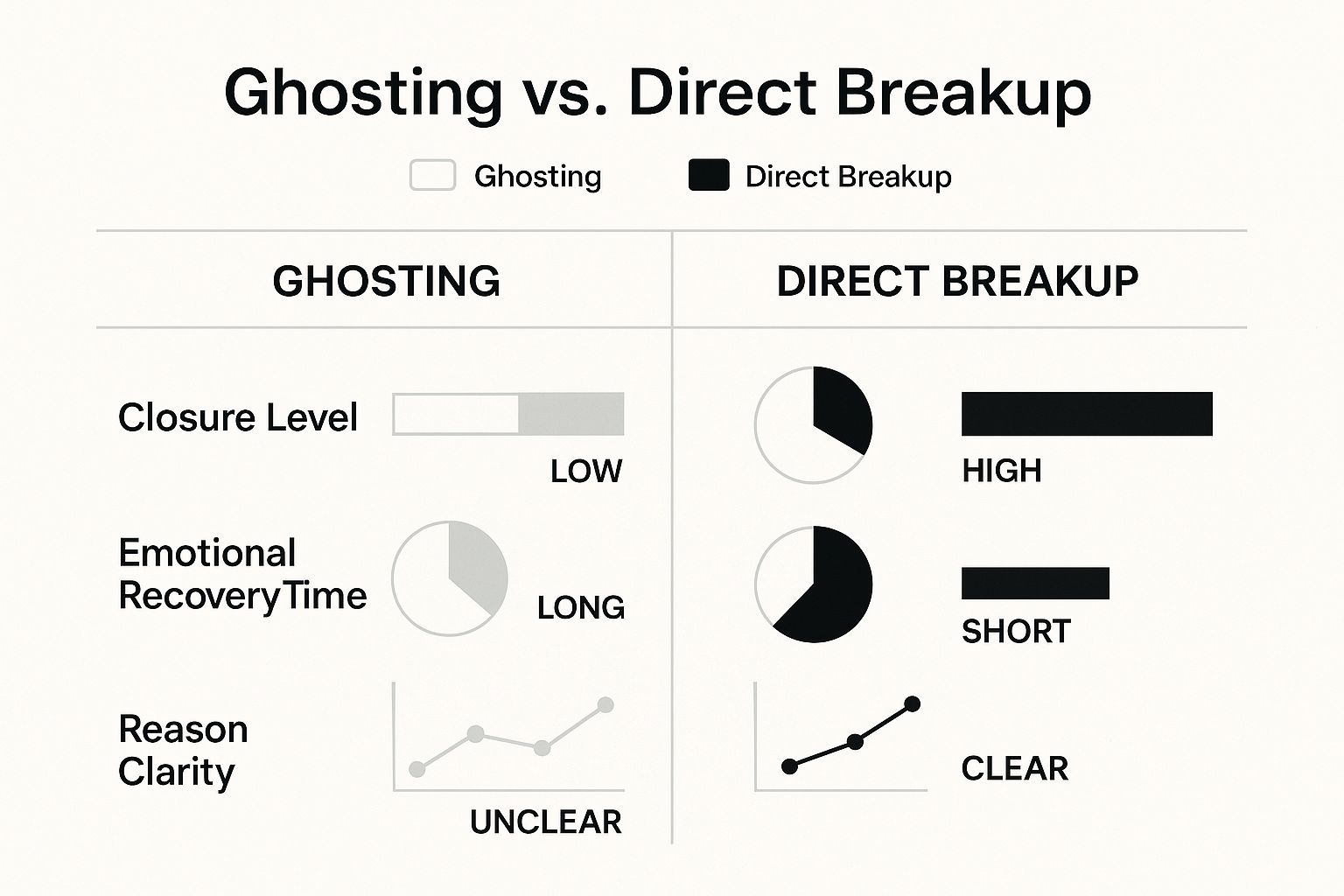
As you can see, the lack of closure from being ghosted can significantly drag out the emotional recovery process. An honest conversation, however painful, allows you to start healing much sooner.
Navigating the Modern Dating Scene
Unfortunately, ghosting is a common hurdle in the UK dating world, partly fuelled by the "swipe fatigue" many feel on dating apps. While some reports show that Generation Z are 32% less likely to ghost than older generations, the behaviour is still widespread, often happening before you've even had a first date. It’s easy to get frustrated, but you can protect yourself by focusing on quality over quantity. You can learn more about why modern dating feels broken and find strategies to manage it.
Here are a few practical habits to adopt:
- Pace yourself emotionally. It's easy to get swept up in great texting banter, but try not to get too emotionally invested before you’ve actually met and seen if the real-life chemistry is there.
- Communicate your needs simply. You don't need to give a long speech. Something like, "I'm really enjoying our chats. I tend to connect best with people who are fairly consistent communicators," works well. It’s a gentle way to set an expectation.
- Trust your intuition. If a situation feels off, it probably is. Don’t let wishful thinking or a fear of being "difficult" talk you out of what your gut is telling you.
Developing these skills will help you feel more in control as you navigate the dating world. For more in-depth guidance, have a look at this comprehensive guide on dating tips for success. Protecting yourself isn’t about building walls or expecting the worst; it's about being prepared, so you can confidently keep searching for the connection you deserve.
Building Stronger Self-Worth After Being Ghosted
The silence from someone who ghosts you can feel like a direct hit to your confidence, making it tough to see your own value clearly. Rebuilding your self-worth isn't about pretending it doesn't hurt; it's about actively deciding that your value is not up for debate, no matter what someone else does or doesn't do. The real work in moving past being ghosted happens inside you, by turning your attention away from their silence and towards your own strength.
The first step is to draw a line between your worth and their actions. Their decision to vanish is a statement about their own ability to handle difficult conversations—or lack thereof—not an accurate measure of you. It feels incredibly personal, but it's important to realise that people who ghost are often running from their own discomfort. Your worth is still there, completely intact, whether they see it or not.
Shifting from External to Internal Validation
A huge part of getting back on your feet is to stop looking for others to tell you that you're enough and start finding that confirmation within yourself. When you rely on others for your sense of worth, you're always one unanswered text away from a crisis. Instead, aim to become your own most reliable source of approval.
Here are some practical ways to start building this inner strength:
- Catalogue your strengths: Seriously, grab a notebook or open a new note on your phone and list everything you're good at. Go beyond your job title. Are you the friend people call in a crisis? Do you make a brilliant cup of tea? Can you always find the perfect GIF for any situation? Write it all down and read it when you feel that self-doubt creeping in.
- Challenge your inner critic: When that voice in your head starts whispering things like, "It's because I'm boring," you need to stop it. Argue back with cold, hard facts. For example, "That's not true. My friends always say I make them laugh, and I had a really engaging chat with a colleague just yesterday." This isn't about forced positivity; it's about correcting the record with what's actually true.
- Celebrate small wins: Did you resist the urge to check their social media? Did you cook yourself a proper, nourishing meal instead of ordering a takeaway? Did you finally finish that workout you've been putting off? Give yourself a mental high-five. These little acts of self-care and discipline are the very foundation of self-respect.
Creating a Supportive Environment
While building your inner fortress is the main goal, your surroundings make a huge difference. Make a point to be around people who see you and appreciate you for who you are. This isn't about finding a new group to slate the person who ghosted you; it’s about reconnecting with the friends and family who remind you of your best qualities. Spend time with people who make you laugh until you cry, family who have your back no matter what, or lose yourself in a hobby that makes you feel competent and proud.
As much as it stings right now, this experience can be a powerful push towards personal growth. By focusing on your own worth, you're not just getting over being ghosted; you're building a more resilient, self-assured you—someone who is far better prepared for whatever else life throws your way. You define your worth, not the silence of someone who didn't know how to use their words.
Moving Forward with Confidence and Clarity
The final part of your healing journey is turning a painful experience like being ghosted into genuine wisdom. It's not about pretending it never happened, but about taking the lessons on board so you don't carry that heavy emotional baggage into future relationships. This is your personal roadmap to rebuilding confidence and learning to date with both your heart and your head.
The aim is to develop healthy dating habits that protect your well-being. This means being unapologetically you, understanding your worth isn't determined by someone else's approval, and trusting your gut when something doesn't feel right. You're building a stronger, more resilient version of yourself who can handle modern dating with a new sense of clarity.
Signs You Are Ready to Date Again
There's no magic timeline for healing, but there are definitely clear signs that you're heading in the right direction. You'll know you're getting there when:
- You no longer feel that compulsive need to check their social media.
- Your main reason for dating is to connect with new people, not to prove you're desirable.
- The thought of going on a first date feels more exciting than it does terrifying.
- You can talk about being ghosted as something that happened in the past, rather than a pain you're still living through.
Maintaining Your Progress
Let's be real, the dating world will always have its ups and downs. When you feel those old anxieties start to surface, take a moment to remind yourself of how far you've come. Your self-worth is non-negotiable, and you're now equipped with the tools to spot red flags and protect your own peace. Every interaction is another chance to practise your new boundaries and reinforce your confidence.
This journey is about creating a foundation of self-respect that no one can shake. By embracing these lessons, you're not just learning how to cope with ghosting; you're learning how to truly thrive.
Ready to explore dating with renewed confidence? Find practical advice, community stories, and expert tips to guide your next steps at DatingBlog.co.uk.
Dating News
How to Spot Fake Dating Profiles A Modern Guide
Learn how to spot fake dating profiles with our guide. We cover photo analysis, message red flags, and verification tips to keep you safe online.

When you're trying to spot a fake dating profile, it's all about looking for things that just don't add up. Think photos that look a little too perfect, bios that say a lot of nothing, and messages that go from zero to a hundred way too fast. A real person's profile usually has a certain consistency and a touch of real-life messiness. Fakes, on the other hand, often have little tells that give the game away—if you know what you’re looking for.
The Reality of Fake Profiles in Modern Dating

Let's be honest, jumping into online dating means you're going to come across fake profiles. They're not just a small-time nuisance; they're a massive problem. The reasons behind them vary wildly, from elaborate financial scams to someone just catfishing for an ego boost. Getting your head around why these profiles exist is the first move in learning how to protect yourself.
Scammers have a well-worn playbook. They’ll often use AI-generated images or pinch photos from someone else's social media, invent detailed but strangely generic backstories, and fire off scripted messages that are all about building a connection as quickly as possible. And this happens far more often than you'd think.
It's a widespread issue. A recent survey found that 54% of UK online daters have spotted suspicious profiles or got dodgy messages at least once a week. That number really brings home how often genuine people are bumping into potential scams.
Now, this isn't to put you off online dating entirely. Far from it. The goal is to arm you with the right knowledge. When you can recognise the classic tactics, you can swipe with a lot more confidence. It's about changing your approach from just flicking through profiles to actively vetting who you're talking to.
Common Motivations Behind Fake Accounts
Understanding why someone would create a fake profile can really help you sharpen your instincts. Most of them fall into a few predictable categories.
- Financial Scams: This is the big one. Scammers play the long game, building an emotional bond before suddenly having a "crisis" that only your money can solve.
- Catfishing: This is all about creating a fake identity to lure someone into a relationship. The motive could be anything from loneliness and personal validation to pure entertainment.
- Malicious Bots: Some fake profiles aren't even run by a person. They’re automated bots programmed to spam you with links to dodgy adult sites or other phishing scams.
The numbers don't lie. Recent data reveals that romance scams are behind 36% of all reported incidents in the UK, with catfishing not far behind at 29%. You can dive deeper into the data on UK online dating threats to see how these trends are shifting. Being aware of the scale of the problem is a powerful tool. It helps you spot those early red flags before you get too emotionally invested.
Decoding Profile Photos for Red Flags
When you're trying to figure out if a dating profile is genuine, the photos are always the best place to start. It’s easy to be drawn in by an attractive picture, but I’ve learned that the real clues are often hidden in the details. You have to look past the smile and really examine what you're seeing.
One of the most powerful tools you have is a reverse image search. It's a simple, free check that tells you if their photo has been lifted from somewhere else online—like another person's social media, a stock photo site, or even a model's portfolio. Honestly, this one step can save you so much time and trouble by exposing a fake right away.
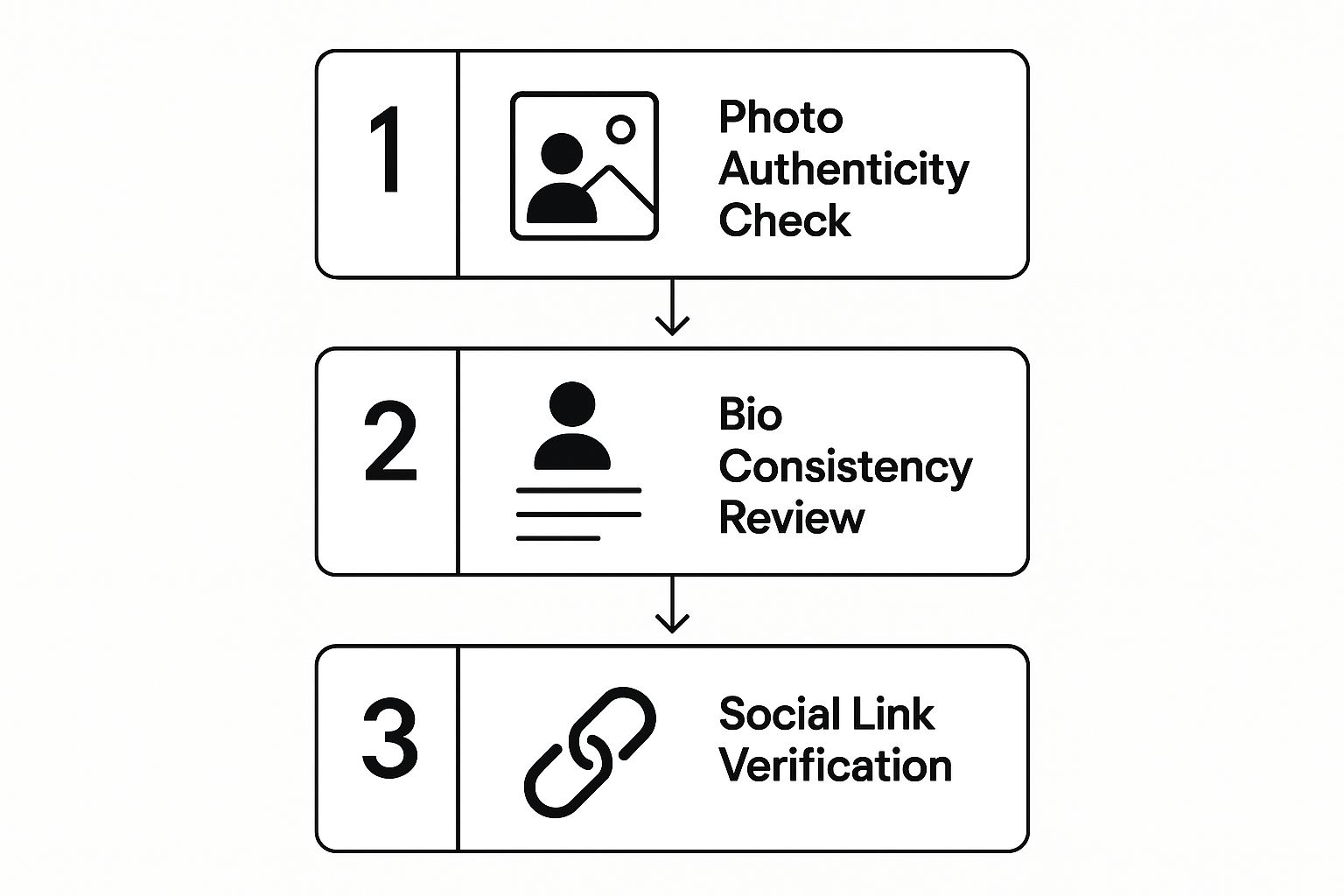
As you can see, checking the photos is a crucial first move, but it's part of a bigger picture that includes looking for consistency across their bio and any other connected accounts.
Common Visual Giveaways
Once you've done a reverse image search, it's time to put on your detective hat and look for other tell-tale signs. Scammers rarely have a full library of candid pictures, and this limitation often reveals itself in predictable ways. Keep an eye out for these classic red flags:
- All Professional Shots: Does every photo look like it came from a magazine shoot? Real people have a mix of pictures—messy holiday snaps, blurry photos with friends, and selfies taken in bad lighting. A profile full of nothing but polished headshots is a major giveaway.
- The Lone Photo: A profile with only one picture is a huge red flag. It's easy for a scammer to find and steal one great photo, but finding a whole album of the same person is much more difficult. Be very suspicious.
- Weirdly Inconsistent Quality: Pay attention to how the photos look together. If one is super sharp and high-res, but the next is grainy and pixelated, it strongly suggests the images were cobbled together from different places on the internet.
When you're looking at profile pictures, it's easy to get bogged down in the details. To make it simpler, I've put together a quick checklist to help you systematically analyse what you're seeing.
Red Flag Photo Analysis Checklist
| Red Flag | What It Looks Like | What You Should Do |
|---|---|---|
| Too Perfect | Every photo is a professional, flawless headshot. No candid or casual shots. | Run a reverse image search to see if the photos appear elsewhere online. |
| Only One Photo | The profile contains a single, often very attractive, picture. | Ask them for another photo or to video chat. A scammer will usually have an excuse. |
| Mismatched Quality | Some photos are crystal clear, while others are blurry, cropped oddly, or pixelated. | This suggests photos were scraped from various online sources. Treat the profile with caution. |
| No Social Context | The person is always alone in their photos. No pictures with friends or family. | Real people usually have photos showing their social life. A lack of this can be a warning sign. |
| Odd Details | Noticeable editing, strange backgrounds, or details that don't match their story (e.g., winter clothes but they claim to live in a hot climate). | Trust your eyes. If something feels off, question it directly or move on. |
Using a simple checklist like this helps you stay objective and spot patterns you might otherwise miss. It turns a gut feeling into actionable evidence.
At the end of the day, trust your instincts. If the photos just feel staged, too polished, or a bit off, it’s worth taking a step back. With some estimates suggesting that up to 10% of all dating profiles are fake, a bit of healthy scepticism is your best friend. When a profile seems too good to be true, it often is.
Reading Between the Lines of Their Bio
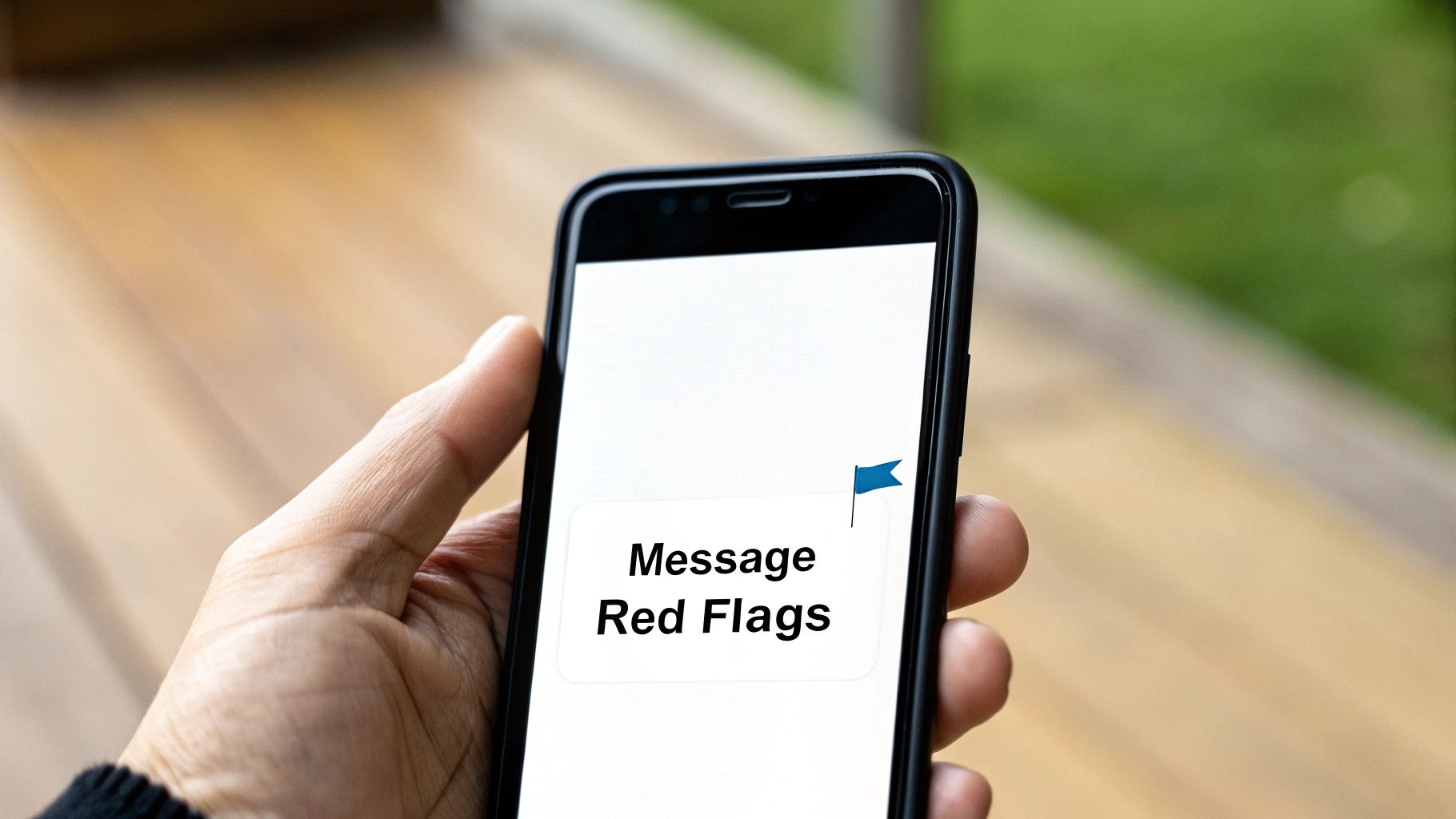
A scammer's profile biography is often a house of cards, built with vague clichés and glaring inconsistencies. The photos might look convincing at first glance, but the bio is usually where their story starts to fall apart. Think about it: genuine profiles tend to have a personal, sometimes even quirky, flavour to them.
Fake profiles, on the other hand, often feel bland and generic. They’re designed to cast the widest net possible. You'll see phrases like "loves travelling, movies, and having a laugh." While lots of people enjoy these things, a profile that offers no specifics is a red flag. A real person might mention they’re saving up to see the Northern Lights or that they’re obsessed with 80s horror films. A scammer just keeps it vanilla.
Vague Descriptions and Emotional Hooks
Be on the lookout for bios filled with dramatic life stories that sound a bit too much like a film plot. Scammers love to use emotional hooks, often claiming to be a widowed doctor working abroad or an international entrepreneur facing a sudden, dramatic crisis. These stories are crafted to make you feel instant sympathy, fast-tracking a sense of intimacy that isn't real.
If their life story reads like a soap opera script and their hobbies are as generic as a stock photo, it’s a major warning sign. Real people are much more nuanced and specific.
Poor grammar and spelling can be another dead giveaway, especially if it doesn't match their supposed background. If someone claims to be a "highly educated professor from London" but their profile is riddled with basic mistakes, you should definitely pause for thought. These are the little threads you can pull to unravel the entire fake persona.
Finally, do a quick sense-check. Does their claimed job and location line up with their described lifestyle? If they say they're a struggling artist but their bio talks about frequent luxury trips, something just doesn't add up.
For more insights on building an authentic profile and spotting genuine effort in others, check out our comprehensive dating tips for success.
Spotting the Red Flags in Their Messages
Once you start chatting, a scammer’s true intentions really start to show. The way they message is often the biggest giveaway because it’s all designed to play on your emotions and bypass your common sense. A real connection takes time to grow, but a scammer wants to rush intimacy.
One of their go-to moves is love bombing. This is where they shower you with over-the-top affection and declare their undying love at a speed that feels… well, a bit unsettling. If someone you’ve been talking to for three days is already calling you their soulmate, it’s not romantic—it’s a huge red flag.
If their messages feel like a perfectly polished script, it’s because they probably are. Scammers often rely on pre-written lines meant to pull at your heartstrings, telling you exactly what you want to hear and mirroring your dreams with uncanny precision.
This tactic is disturbingly effective, which is why you need to keep a level head. Recent figures from the Barclays Scams Bulletin revealed that romance fraud in the UK shot up by 20% year-on-year. Even more concerning, 21% of adults on dating apps have been asked for money. You can read the full breakdown on the rise of UK romance scams to see just how widespread this issue has become.
The Classic Excuses and Inevitable Demands
A massive warning sign I see all the time is a complete refusal to meet up or even jump on a quick video call. Scammers always have a ready-made excuse.
- "My camera is broken." Honestly, this is the oldest trick in the book. It’s 2024; almost everyone has a functioning camera in their pocket.
- "I'm working on an oil rig / serving overseas." By creating a situation where meeting is physically impossible, they can keep the con going for months.
- "Let's chat on WhatsApp instead." This is a big one. They want to get you off the dating app’s secure platform as fast as possible, moving the conversation somewhere their account can’t be easily flagged or reported.
And then comes the final, undeniable proof you’re talking to a scammer: the request for money. The story will be heart-wrenching and urgent—a sudden medical bill, a lost wallet while travelling, or a business investment that’s about to fall through. No matter how genuine it sounds, you must never send money to someone you only know from online.
Knowing how to write a good opening message is great, but knowing when to walk away is far more important. If you want to polish your own approach (the genuine kind!), you can take a look at our guide on how to impress with a first message on a dating app.
How to Discreetly Verify Their Identity

A bit of simple verification now can save you a world of heartache later. After you've scrutinised their photos and bio, it’s time to see if their story holds up across the web. This isn't about playing detective; it's about being savvy and using simple checks to confirm they are who they say they are.
A quick, non-intrusive search is the perfect place to start. Just use their name and any other breadcrumbs they’ve dropped—like their job title or city—and see what pops up on other social or professional sites.
Building a Consistent Picture
Searching for them on platforms like LinkedIn or even Instagram can tell you a lot. What you're looking for aren't exact one-to-one matches, but the hallmarks of a real, lived-in digital life. Is there a LinkedIn profile that backs up their claimed profession and career path? Does their Instagram have photos with friends and family that stretch back a few years?
Keep an eye out for these tell-tale signs of an authentic digital footprint:
- Consistency Across Platforms: The details on their LinkedIn should roughly match what they've told you and what’s on their dating profile.
- Signs of Genuine Activity: A real social media account will often have tagged photos, comments from friends, and a posting history that spans years, not weeks. A brand-new account with a handful of posts is a major red flag.
- Mutual Connections: On some networks, you might even find you have friends in common—a massive green flag for legitimacy.
Here's something to keep in mind: a complete absence of a digital footprint can be just as suspicious as conflicting information. In this day and age, very few people have zero online presence. It could mean they’re hiding something, or that the person you're talking to is a complete fabrication.
This kind of basic online vetting helps you piece together a more complete, trustworthy picture of the person on the other end. It’s a straightforward but incredibly effective way to spot a fake profile before you get too invested.
What to Do When You Suspect a Fake Profile
That sinking feeling when you realise the person you're talking to might not be real is deeply unsettling. But don't panic. The most important thing is to act decisively to protect yourself and stop them from preying on anyone else.
Your best friends in this situation are the block and report functions. Every decent dating app has them, and you shouldn't think twice about using them. Reporting flags the profile for the app's safety team to investigate and, hopefully, remove. Blocking cuts off all contact immediately, giving you instant peace of mind. It’s a clean break.
Taking Decisive Action
This is why it pays to choose dating apps with robust safety features right from the start. Things like photo verification, often shown as a blue tick or badge, mean the platform has at least tried to confirm the user is who they say they are. It’s not foolproof, but it’s a simple hurdle that makes life much harder for a scammer.
Trust your gut. It's your most reliable tool in online dating. If something feels off, it probably is. Don't get drawn into a game of trying to expose them—just report, block, and move on. Your emotional energy is as valuable as your personal data.
Learning to handle these situations is, unfortunately, part of the modern dating experience. For more guidance on building safer and more genuine interactions, check out our guide on relationship advice for stronger connections.
If You've Already Sent Money or Information
If things have gone further and you've shared sensitive details or, worse, sent money, you need to act fast. It's easy to feel embarrassed, but please don't. These scammers are masters of manipulation, and their tactics can fool even the savviest people.
Here’s what you need to do, right now:
Contact your bank or credit card company immediately. Tell them you've been a victim of fraud. They can take steps to stop any further payments and will advise you on the chances of recovering your money. The quicker you act, the better.
Report the crime to Action Fraud. This is essential. Action Fraud is the UK’s national centre for reporting fraud and cybercrime. Filing a report creates an official record and helps the authorities build a case against these criminals.
The scale of this problem is staggering. Between early 2020 and late 2024, UK authorities dealt with almost 40,000 reported cases of dating fraud, with victims losing a colossal £409.7 million. You can learn more about the latest UK dating scam statistics to understand just how widespread this is. Your report is a crucial step in fighting back.
At DatingBlog.co.uk, our mission is to help you navigate modern romance safely and with confidence. You'll find more expert advice, in-depth app reviews, and insights across our site. Start your journey to better connections at https://datingblog.co.uk.
Dating News
7 Fun 1st Date Ideas to Try in the UK (2025)
Tired of the usual? Discover our curated list of fun 1st date ideas to make a lasting impression. Find unique and creative options to suit any budget in the UK.

Stepping into the dating world can feel like navigating a maze of clichés. The predictable 'let's grab a drink' suggestion, while safe, often misses the opportunity to create a truly memorable connection. A first date is your initial canvas; it's a chance to paint a picture of who you are and genuinely discover the person sitting opposite you. This is why exploring more engaging and fun 1st date ideas is not just about being different, it's about creating a shared experience that sparks real conversation.
A well-chosen activity reveals personality in ways a simple chat over a pint might not. Whether you're swiping on apps or meeting someone through friends, the right setting can break the ice effortlessly and set the stage for something meaningful. This guide is organised to move beyond the ordinary, offering a curated list of seven dynamic, practical, and enjoyable ideas tailored for the modern UK dater. We'll explore options for every budget, interest, and season, providing the actionable insights you need to plan a first encounter that feels authentic and exciting. Forget awkward silences and think shared laughter, friendly competition, and genuine moments of discovery.
1. The Upgraded Classic: A Specialty Coffee Shop Date
Meeting for a coffee is a timeless first date for good reason. It’s a low-pressure, low-commitment way to test the waters and see if there’s a spark. However, you can elevate this simple meet-up from a mundane interview into a memorable experience by choosing the right venue. Instead of a generic chain, opt for an independent roastery or a café with a distinct personality. This simple choice demonstrates thoughtfulness and a bit of local savvy, setting a positive tone right from the start.

The goal is to find a place that offers more than just caffeine; it should be a conversation starter in itself. A unique setting provides an immediate topic of discussion, helping you bypass the initial awkwardness. Whether it's the quirky decor, the intricate brewing methods, or a unique theme, the environment itself can help fuel natural, flowing conversation. This makes it one of the most reliable and fun 1st date ideas for getting a genuine feel for someone’s personality.
How to Make It a Success
To ensure your coffee date is a hit, a little preparation goes a long way.
- Location is Key: Choose a spot that is convenient for both of you. A café with comfortable seating and a moderate noise level is crucial for easy conversation. Consider places like a cosy café-bookstore where you can browse shelves, or an artisan bakery known for its incredible pastries.
- Do Your Homework: Take five minutes to research the café online. Check their menu for interesting drinks or snacks you can recommend. Knowing they have a signature lavender latte or award-winning cinnamon buns shows initiative.
- Logistical Grace: Arrive a few minutes early to grab a good table, preferably one that isn’t too close to the door or the noisy counter. Be prepared to pay for both drinks; it’s a small, courteous gesture that is always appreciated, regardless of who initiated the date.
2. Art Gallery or Museum Visit
For a first date that feels sophisticated and sparks intellectual curiosity, a visit to an art gallery or museum is an excellent choice. This idea moves beyond the standard interview format of a coffee date, providing built-in talking points that can reveal a person’s creativity, sense of humour, and perspective on the world. It’s an interactive experience that encourages movement and shared discovery, which helps to ease first-date jitters and create a sense of partnership.

Exploring exhibits together allows conversation to flow naturally from your surroundings. You can discuss which pieces you love, which ones you find bizarre, and what emotions they evoke. This shared activity is one of the most fun 1st date ideas because it helps you learn about each other’s tastes and interests in a dynamic and low-pressure environment. Whether you're analysing a classic painting or experimenting with a hands-on science exhibit, you're creating a shared memory from the outset.
How to Make It a Success
A little planning can turn a simple museum trip into a truly impressive date.
- Choose the Right Exhibition: Pick a gallery or museum that aligns with a potential shared interest, or choose one with a diverse collection. A museum with a special, temporary exhibition adds a sense of timeliness. Consider a local history museum, a contemporary photography gallery, or even a science museum with interactive displays.
- Check the Logistics: Research opening times and admission fees beforehand. Many museums have free admission days or late-night openings with a more social atmosphere, which can be a perfect date-night setting. Allow at least two hours for the visit so you don't feel rushed.
- Plan a Follow-Up: Having a plan to grab a coffee, drink, or light meal at a nearby café afterwards is a great move. It provides a relaxed setting to discuss your favourite pieces and continue the conversation. This thoughtful touch can make the entire experience feel more complete and considered, as detailed in these proven first date ideas for a successful romantic experience.
3. Farmers Market or Food Festival
For a date that’s vibrant, interactive, and full of flavour, a trip to a local farmers market or a bustling food festival is an unbeatable choice. This idea moves away from a static, face-to-face setup and into a dynamic environment. Strolling through colourful stalls of fresh produce, artisan cheeses, and sizzling street food provides endless natural conversation starters, making it one of the most engaging and fun 1st date ideas for discovering shared tastes.

The sensory-rich atmosphere allows you to learn about each other in an organic way. You’ll quickly discover their feelings on everything from spicy food to sweet treats, all while enjoying a light physical activity. It’s a low-pressure setting where you can move at your own pace, sampling goods and supporting local vendors. This shared experience feels less like an interview and more like a small adventure, creating a positive and memorable foundation.
How to Make It a Success
A little planning can transform a simple market visit into a fantastic date.
- Pick the Right Venue: Not all markets are created equal. Look for one with a good mix of food stalls, produce, and perhaps even live music to enhance the atmosphere. A seasonal harvest festival, a weekly city market, or a specific food truck event all offer unique vibes.
- Logistical Prep: Arrive early to avoid the biggest crowds and get the best selection. Many vendors still prefer cash, so bring some with you just in case. Also, dressing comfortably is a must; you’ll be on your feet, so practical footwear is key.
- Embrace Sharing: The best part of a food-focused date is trying things together. Suggest sharing a few small items, like a gourmet sausage roll or a box of fresh berries. This creates natural moments of connection and collaboration, helping you bond over a shared culinary experience.
4. Mini Golf or Bowling
Engaging in a light-hearted activity is a fantastic way to break the ice and inject some playful energy into a first meeting. Mini golf or bowling are classic choices because they shift the focus from intense, face-to-face conversation to a shared, interactive experience. This creates natural lulls and highs, allowing conversation to flow more organically around the activity, which is perfect for easing first-date jitters. It’s a chance to laugh at a missed putt or a gutter ball, revealing a lot about someone's sense of humour and how they handle a little friendly competition.

Choosing an activity-based date like this signals that you’re up for a bit of fun and not just a formal interview. The shared goal, whether it’s conquering a windmill obstacle or trying for a strike, builds instant camaraderie. These types of fun 1st date ideas are less about showcasing athletic skill and more about creating shared memories and observing how you interact together in a low-stakes, entertaining environment.
How to Make It a Success
A successful activity date is all about the atmosphere and attitude.
- Pick the Right Venue: Ambiance is crucial. Look for a quirky, themed mini-golf course with creative obstacles or a retro bowling alley with a cool, vintage vibe. Some venues even offer glow-in-the-dark or cosmic bowling sessions, adding another layer of novelty to the experience.
- Keep it Playful, Not Competitive: The goal is connection, not victory. Keep the mood light and focus on having fun together. Offer encouragement, celebrate good shots (both yours and theirs), and laugh off the bad ones. Your reaction to a silly mistake says more than a perfect score ever could.
- Plan a Post-Game Chat: The activity is a great icebreaker, but you still need time to talk. Choose a venue that has an attached bar, café, or arcade. This makes it easy to grab a drink or a snack afterwards to discuss the game and get to know each other better without the pressure of the activity itself.
5. Cooking Class or Food Workshop
Diving into a cooking class or food workshop is a fantastic way to bypass traditional first date nerves. Instead of facing each other across a table, you’re working side-by-side, creating something delicious together. This shared activity fosters collaboration and reveals a lot about a person’s ability to work as a team, their patience, and how they handle a little culinary chaos. It’s an engaging, hands-on experience that ends with a rewarding meal you both helped prepare.
This date idea is perfect because it combines learning a new skill with genuine interaction. The structure of the class provides natural conversation prompts, eliminating the pressure to constantly think of what to say next. Whether you're mastering the art of pasta-making, rolling sushi, or decorating cupcakes, you’re building a shared memory right from the start. This makes it one of the most interactive and fun 1st date ideas for creating an immediate bond.
How to Make It a Success
A successful culinary date hinges on choosing the right class and having the right mindset.
- Choose Wisely: Pick a cuisine or skill you both find exciting. Italian, Thai, or even a baking workshop are usually safe bets. Check local culinary schools, community centres, or even restaurants that host special classes. Ensure the class length fits a first date, aiming for around two to three hours.
- Book in Advance: Popular classes fill up quickly, so book your spot well ahead of time. This shows great planning and ensures you won’t face a last-minute disappointment. Arrive with an appetite, as you’ll almost always get to enjoy the fruits of your labour at the end.
- Embrace the Experience: Don’t worry about being a master chef. The goal is to have fun, not to achieve culinary perfection. Be prepared to laugh at mistakes, help each other out, and enjoy the process. Wear comfortable clothes and closed-toe shoes suitable for a kitchen environment. While a gift isn't expected on a first date, you might find some inspiration for the future; you can discover some thoughtful gift ideas on datingblog.co.uk if things go well.
6. Outdoor Adventure (Hiking, Park Walk, Beach)
Swapping the confines of a café or bar for the great outdoors can be a refreshing and dynamic way to get to know someone. An outdoor date, whether it’s a scenic hike, a relaxed park walk, or a stroll along the beach, removes the pressure of constant eye contact and allows for more natural, side-by-side conversation. This setting provides a shared experience and beautiful scenery, offering plenty of organic talking points to keep the dialogue flowing.
The beauty of this date is its simplicity and flexibility. It taps into a sense of shared discovery, creating a memorable "we did this together" moment right from the start. Plus, the light physical activity can release endorphins, helping both of you feel more relaxed and positive. Choosing an outdoor activity is one of the most enjoyable and fun 1st date ideas for active people or anyone looking to break away from the conventional sit-down meet-up.
How to Make It a Success
A successful outdoor date is all about thoughtful planning and clear communication.
- Choose the Right Location: Select a route or location that matches both of your fitness levels. A sprawling urban park like London’s Richmond Park, a gentle coastal path, or a well-marked nature trail are excellent choices. Ensure it's a popular and safe public area.
- Communicate Clearly: Be upfront about the plan. Let your date know what to expect regarding the terrain and duration, so they can dress appropriately in comfortable shoes and weather-suitable clothing. This shows consideration for their comfort.
- Come Prepared: Check the weather forecast beforehand and have a backup plan (like a nearby pub or café) if it turns. Bring essentials like water, a couple of light snacks, and make sure your phone is fully charged. Planning ahead for parking or public transport saves a lot of stress.
7. Local Event or Festival
Diving into a local festival or community event is a fantastic way to break free from traditional date formats. Instead of a one-on-one interview, you share an experience, creating instant common ground and a dynamic environment filled with energy and things to talk about. This option shows you're engaged with your community and open to vibrant, spontaneous fun.
The beauty of a festival date lies in its built-in entertainment and relaxed atmosphere. Whether it’s an outdoor movie screening, a local music festival, or a cultural food fair, the event itself provides a constant source of amusement and conversation. This shared activity helps ease any initial pressure, allowing you to observe how your date interacts with the world around them while building a stronger connection. This approach makes it one of the more memorable and fun 1st date ideas for creating a shared story from the very beginning.
How to Make It a Success
A little planning can turn a good event date into a great one.
- Do Your Research: Look up local event listings online, on community notice boards, or on social media. Choose an event that aligns with both your interests, whether it's an art and craft fair, a community theatre production, or a seasonal celebration.
- Plan the Logistics: Check the event’s duration, location, and parking situation. Arriving a bit early helps you settle in without rushing. Bring some cash, as smaller vendors at festivals often don't accept cards.
- Be Flexible: The best part of a festival is the potential for spontaneity. While it’s good to have a rough plan, be open to exploring different stalls, trying unusual foods, or listening to a band you’ve never heard of. This adaptability is a key part of the fun.
7 Fun 1st Date Ideas Comparison
| Date Idea | Implementation Complexity 🔄 | Resource Requirements ⚡ | Expected Outcomes 📊 | Ideal Use Cases 💡 | Key Advantages ⭐ |
|---|---|---|---|---|---|
| Coffee Shop Date | Low – simple to arrange | Low – minimal cost | Comfortable conversation, safety | Low-pressure, first meetings | Affordable, flexible, public safety |
| Art Gallery or Museum Visit | Medium – requires planning/time | Low to medium – admission fees | Cultural bonding, meaningful conversation | Those interested in culture and art | Built-in conversation topics |
| Farmers Market or Food Festival | Medium – timing/location dependent | Low – mostly free entry | Shared sensory experiences, food discovery | Food lovers, community event enthusiasts | Multi-sensory, supports local vendors |
| Mini Golf or Bowling | Low to medium – booking recommended | Low – affordable entertainment | Fun competition, breaks conversation tension | Active, playful dates | Light physical activity, humor |
| Cooking Class or Food Workshop | High – advance booking needed | Medium to high – cost of class | Collaboration, tangible results, skill learning | Hands-on, culinary enthusiasts | Teamwork, memorable experience |
| Outdoor Adventure (Hiking, Park Walk, Beach) | Medium – depends on location/fitness | Low – free or low cost | Physical activity, meaningful conversation | Active, nature-loving individuals | Promotes well-being, natural setting |
| Local Event or Festival | Medium – depends on event timing | Low – often free or low cost | Shared cultural experience, entertainment | Social, culturally interested couples | Unique experiences, community support |
Crafting Your Perfect First Encounter
Navigating the world of dating can feel like a complex puzzle, but choosing the right first date shouldn't be the hardest part. As we've explored, the most successful and fun 1st date ideas are not necessarily the most extravagant or expensive. Instead, they are the ones that create a comfortable environment for genuine connection, shared laughter, and authentic conversation.
The central theme weaving through every suggestion, from the creative energy of an art gallery to the collaborative spirit of a cooking class, is the importance of a shared experience. A great first date moves beyond a simple question-and-answer session. It becomes a small story you create together, whether it’s navigating a bustling farmers' market or cheering each other on at the bowling alley. These activities provide natural conversation starters and help you see a different, more relaxed side of your date’s personality.
Key Takeaways for Your Next Date
To truly make your next first date a success, keep these core principles in mind:
- Authenticity Over Spectacle: Choose an activity that reflects your own interests and personality. If you're not an outdoorsy person, a strenuous hike might not be the best representation of who you are. Honesty in your choice of venue sets a precedent for an honest connection.
- Balance Conversation and Activity: The ideal date has a perfect mix of doing and talking. Activities like mini-golf or a walk in the park allow for lulls in the action, providing organic moments for conversation to flow without the pressure of constant eye contact.
- Prioritise Comfort and Safety: The best fun 1st date ideas are those where both people feel completely at ease. This means choosing a public place, considering your date’s comfort levels, and keeping the initial commitment low-pressure. A coffee date is brilliant because it can be extended to a walk or end gracefully after an hour.
Ultimately, the goal of a first date isn't to secure a second one; it's to enjoy a moment in time with another person and see if your energies align. By shifting the focus from "performance" to "presence," you remove immense pressure from yourself and your date. You create a space where you can both be yourselves, which is the only foundation upon which a real relationship can be built. So, take these ideas as a blueprint, personalise them to fit your style, and step into your next first date with confidence and an open mind. The adventure is just beginning.
Ready for more expert advice on navigating the modern dating landscape? For deeper insights, relationship tips, and even more fun 1st date ideas, visit DatingBlog.co.uk. Let us be your trusted companion on your journey to finding a meaningful connection.
Dating News
8 Essential First Date Topics to Spark a Genuine Connection
Struggling with first date topics? Explore our list of 8 engaging conversation starters to move beyond small talk and build a real connection. Read now!

The first date is a delicate balance of excitement and nerves. The pressure to make a good impression can often lead to stilted conversations or falling back on tired clichés. But what if you could bypass the awkward small talk and dive into discussions that genuinely reveal personality, build rapport, and set the stage for a real connection? This guide is designed to do just that, offering a curated selection of engaging first date topics that move beyond the surface.
Forget generic advice; these are strategic prompts to help you understand your date's values, passions, and worldview. At DatingBlog.co.uk, we specialise in providing modern singles with the tools for meaningful romance, and a great conversation is the first step. We’ve organised each topic with specific questions and practical tips to ensure the dialogue flows naturally, helping you learn about everything from their travel dreams and hobbies to their career journey and life goals. By the end of this article, you will have a comprehensive toolkit to transform any first meeting from an interview into an engaging, memorable experience. This isn't just about avoiding awkward silences; it's about building a foundation for something more.
1. Travel Experiences and Dreams
Discussing travel is one of the most reliable and revealing first date topics. It opens a window into your date's personality, values, and zest for life. Whether recounting past adventures or sharing future aspirations, this conversation allows you to discover common interests and gauge each other's sense of curiosity and openness to new experiences.

It’s a topic that naturally encourages storytelling, moving beyond simple Q&A and into a more dynamic and engaging exchange. You can learn whether they are a meticulous planner or a spontaneous adventurer, a luxury seeker or a budget backpacker. This isn't just about listing destinations; it’s about sharing the feelings and memories attached to them.
Why This Topic Works So Well
Talking about travel is universally appealing and less intrusive than other personal topics. It provides a positive and aspirational framework for conversation, keeping the mood light while still offering depth. It is an excellent way to see how your worldviews might align.
Key Insight: Focus on the why behind their travel choices. Asking what drew them to a specific place or what they learned from an experience offers much deeper insight than simply asking where they have been.
How to Approach the Conversation
Keep the discussion inclusive and avoid making anyone feel inexperienced. If your date hasn't travelled internationally, pivot to local explorations or dream destinations.
- Start Broad: Begin with an open-ended question like, "Have you done any travelling you've particularly enjoyed?" or "If you could hop on a plane tomorrow, where would you go?"
- Share Your Own Stories: Offer a brief, interesting story of your own. Mentioning a funny travel mishap can be very endearing and shows you don’t take yourself too seriously.
- Ask Follow-Up Questions: Go beyond the surface. Instead of just "Did you like it?" ask, "What was the most surprising thing you discovered there?" or "What's your favourite memory from that trip?"
This approach ensures the conversation remains balanced and becomes a shared exploration rather than an interview, making it one of the most effective first date topics for building a genuine connection.
2. Hobbies and Passions
Delving into hobbies and passions is a fantastic way to understand what truly makes your date tick. This topic uncovers what energises them, how they spend their free time, and what they value outside of work. It’s a direct look into their personality, revealing whether they are creative, analytical, adventurous, or community-oriented.

Talking about what you love doing naturally brings out enthusiasm and positive energy, making the conversation more animated and genuine. Whether it's a passion for rock climbing that reveals a love for physical challenges, a dedication to cooking that shows a nurturing side, or an interest in photography that highlights a creative eye, these details are invaluable.
Why This Topic Works So Well
Hobbies are a low-pressure, high-reward area of conversation. Unlike work or family history, they are chosen interests, offering a pure reflection of someone's personality. This is one of the most effective first date topics because it opens doors to finding shared interests and planning potential second dates.
Key Insight: The goal isn't just to list activities but to understand the feeling behind them. Ask what they get out of their hobby or what they love most about it to uncover their core motivations and values.
How to Approach the Conversation
Show genuine curiosity and be prepared to share your own passions with equal enthusiasm. The key is to create a balanced exchange, not an interrogation.
- Open with a Casual Question: Start with something relaxed like, "What do you love to do when you're not working?" or "Have you picked up any interesting hobbies lately?"
- Share Your Own Passions: Talk about one of your interests and what it means to you. For example, "I've recently gotten into watercolour painting; I find it so relaxing." This invites them to share in return.
- Ask Deeper Follow-Up Questions: Move beyond the surface. Inquire with questions such as, "That sounds fascinating, how did you first get into that?" or "What's the most rewarding part of that for you?"
This approach allows the conversation to flow organically, building a connection based on the things that bring you both joy and fulfilment.
3. Career and Professional Journey
Navigating conversations about work on a first date can be a delicate balance, but when handled correctly, it offers valuable insight into a person's passions, ambitions, and values. Discussing professional journeys isn't about reciting a CV; it's about understanding what drives someone, what challenges they enjoy, and how they see their contribution to the world.

This topic can reveal a lot about a person’s character. For instance, a teacher's story about their passion for education or an entrepreneur's tale of their startup's highs and lows provides a much deeper understanding than their job title alone. It’s an opportunity to connect over shared values like dedication, creativity, or work-life balance.
Why This Topic Works So Well
A person’s career often takes up a significant portion of their life, making it a relevant and substantial area of conversation. It moves beyond superficial chat to explore what a person is truly passionate about and proud of. When approached with curiosity, it becomes one of the more revealing first date topics for gauging long-term compatibility.
Key Insight: The goal is to understand the person, not the position. Focus on their feelings about their work, the "why" behind their career choices, and the stories they tell, rather than getting bogged down in industry jargon or salary talk.
How to Approach the Conversation
The key is to keep the tone light and inquisitive, not like a job interview. Frame your questions around experiences and feelings to ensure the discussion remains personal and engaging rather than purely professional.
- Start Broad: Use open-ended questions like, "What’s the most interesting or surprising thing that’s happened to you at work?" or "What led you down your current career path?"
- Share Your Own Journey: Talk about what you find fulfilling in your own work or mention a project you're excited about. This creates a reciprocal exchange.
- Ask Follow-Up Questions: Dig deeper with genuine curiosity. Ask, "What do you enjoy most about what you do?" or "What's the biggest lesson you've learned in your career so far?"
By focusing on passion and personal growth, you can transform a potentially dry topic into a fascinating window into your date's world, making the conversation both meaningful and memorable.
4. Food and Dining Experiences
Food is a universal language, making it one of the most enjoyable and effortless first date topics. It's a subject everyone can relate to, offering a fun way to explore cultural backgrounds, personal preferences, and lifestyle choices. From favourite childhood meals to ambitious cooking projects, this conversation can reveal a lot about a person’s sense of adventure and comfort.

This topic is more than just listing favourite cuisines; it’s about sharing stories and experiences. Discussing food can organically lead to planning a second date, whether it's trying a recommended restaurant or even cooking together. It uncovers whether your date is an adventurous eater, a home-comforts connoisseur, or a passionate home cook.
Why This Topic Works So Well
Talking about food is inherently positive and low-pressure. It taps into memories, traditions, and simple pleasures, fostering a sense of warmth and connection. It’s a brilliant way to find common ground and learn about each other's daily lives and cultural roots without being too intrusive.
Key Insight: Go beyond likes and dislikes. Asking about a food that evokes a strong memory or a family recipe they cherish can reveal personal stories and emotional connections, making the conversation far more meaningful.
How to Approach the Conversation
Keep the discussion light, positive, and inclusive. Focus on enjoyment and exploration rather than dietary restrictions or criticisms, which can dampen the mood. The goal is to share and connect over a shared human experience.
- Start with Broad Questions: Kick off with something open and inviting, like, "Have you tried any great new restaurants lately?" or "What's the best meal you've had this year?"
- Share Your Own Experiences: Talk about a dish you love to cook or a funny story about a time you tried something exotic. This makes the conversation a two-way street and shows your own personality.
- Ask About Their Background: Inquire gently about food from their childhood or family traditions. Questions like, "Was there a special dish your family always made for celebrations?" can lead to lovely, personal anecdotes.
By exploring this subject, you can not only have an engaging chat but also gather ideas for future romantic experiences, perhaps finding some inspiration from these proven first date ideas for a successful romantic experience in the UK. This makes food one of the most versatile and rewarding first date topics available.
5. Entertainment Preferences
Discussing entertainment preferences like films, TV shows, music, and books is a fantastic way to find common ground and understand your date's cultural tastes. This topic is light, fun, and offers countless avenues for conversation, revealing personality traits and shared interests without feeling too intrusive. It helps you see if your pop culture worlds align, which can be a strong indicator of compatibility.
From bonding over a mutual love for a niche sci-fi series to discovering you both frequent the same local music venues, these shared passions create an immediate connection. Learning about their entertainment choices provides a snapshot of how they unwind, what makes them laugh, and what stories resonate with them. It’s a comfortable yet insightful way to explore each other's inner worlds.
Why This Topic Works So Well
Entertainment is a universally relatable subject that keeps the atmosphere relaxed and enjoyable. It acts as a low-stakes entry point into more personal values and perspectives. Sharing what you watch, read, or listen to is an excellent way to gauge compatibility in lifestyle and leisure activities, making it one of the most reliable first date topics.
Key Insight: Go beyond just listing favourites. Ask why they love a particular film or what they get from a certain type of music. Understanding their emotional connection to entertainment reveals much more about their personality than the titles themselves.
How to Approach the Conversation
The goal is to foster a shared exchange, not to test each other's knowledge. Be open-minded and show genuine curiosity about their tastes, even if they differ from your own.
- Start with Recent Enjoyment: Ask, "Have you seen or read anything brilliant lately?" This is less pressure than asking for an all-time favourite.
- Find Common Ground: If you discover a shared love for a TV show, dig deeper. "Who's your favourite character? What did you think of the last season's finale?"
- Share and Recommend: Offer a recommendation of your own. Saying, "If you liked that, you might love this book I just finished," shows you're engaged and opens the door for future conversations.
This approach turns a simple chat about entertainment into a dynamic exploration of shared interests, building a foundation for a genuine connection. It’s an easy-going topic that can quickly highlight your compatibility.
6. Family and Background
Carefully discussing family and background can be one of the most rewarding first date topics, offering a glimpse into what has shaped a person. It reveals their values, traditions, and the important relationships that have influenced them. Approached with sensitivity, this conversation can build a foundation of genuine understanding and emotional connection.
This topic moves beyond surface-level chatter to explore the roots of someone's personality. Sharing positive childhood memories, funny family anecdotes, or meaningful traditions helps to humanise both of you. It's an opportunity to discover their cultural heritage, what they learned growing up, and how they relate to the people closest to them.
Why This Topic Works So Well
Understanding someone's family dynamics and upbringing provides context for who they are today. It's a topic that, when handled correctly, signals a deeper interest in them as a person, not just a potential partner. It can uncover shared values and life lessons, creating a powerful sense of connection and seeing if your core principles align.
Key Insight: The goal is not to interrogate, but to share. Frame the conversation around positive experiences and general values. Asking about a favourite family tradition or a funny story about a sibling is much more effective than asking direct, potentially sensitive questions.
How to Approach the Conversation
Navigating this topic requires tact and emotional intelligence. Always start light and be prepared to change the subject if your date seems uncomfortable. The key is to keep it positive and focused on broad themes rather than intimate details.
- Start Broad: Use open-ended questions like, “Are you close with your family?” or “Do you have any fun family traditions?”
- Share Your Own Stories: Lead by example. Share a brief, heartwarming, or amusing story about your own family. This makes it a reciprocal exchange and builds trust.
- Ask Follow-Up Questions: If they mention a sibling, you could ask, "What were you two like as kids?" If they talk about a tradition, ask, "Is that something you'd want to carry on?" Acknowledging if they have children and showing interest is also important; dating someone with kids has its own unique dynamics that are valuable to understand.
By keeping the tone light and respectful, you can make this one of the most connecting first date topics, showing that you’re interested in understanding them on a much deeper level.
7. Life Goals and Aspirations
Discussing life goals and aspirations is one of the most powerful first date topics for understanding long-term compatibility. This conversation moves beyond the present moment to explore future dreams, revealing a person’s core values, drive, and what truly motivates them. It offers a glimpse into their life’s direction and whether your paths might one day align.
This topic allows you to see what excites your date about the future. Are they driven by career ambitions, personal growth, creative pursuits, or a desire to make a difference in the world? Sharing these vulnerabilities can create a surprisingly deep connection early on, building a foundation based on mutual respect for each other’s ambitions.
Why This Topic Works So Well
Talking about aspirations is inherently positive and forward-looking. It lifts the conversation into an inspiring space, showing you both as individuals with purpose and passion. It’s a fantastic way to gauge ambition and priorities without being overly serious or intrusive, helping you understand what kind of life they envision for themselves.
Key Insight: The goal isn't to judge their ambitions but to understand their passion. Listen for the excitement in their voice when they talk about their dreams, whether it’s starting a business, writing a novel, or mastering a new skill.
How to Approach the Conversation
This topic requires a little finesse to avoid sounding like a job interview. Frame it with curiosity and positivity, making it clear you are interested in their passions, not just their five-year plan.
- Ease Into It: Start with a gentle prompt like, "Is there anything you're really passionate about working towards right now?" or "What's a big dream you have for the next few years?"
- Share Your Own Dreams: Be willing to open up first. Sharing one of your own aspirations, big or small, shows vulnerability and encourages them to do the same.
- Focus on Growth: Ask questions that centre on personal fulfilment. For instance, "What skill would you love to learn if you had all the time in the world?" or "Is there a creative project you dream of starting?"
- Explore More Tips: For a broader overview of how to build rapport, you can explore more detailed dating tips for success on datingblog.co.uk.
This approach ensures the discussion remains an exciting exchange of dreams, not a formal evaluation, making it a brilliant method for assessing compatibility while keeping the date’s atmosphere uplifting.
8. Childhood and Formative Experiences
Sharing stories from your childhood offers a unique way to build emotional connection and understand how your date became the person they are today. This topic delves into formative experiences and nostalgic memories, revealing core values and personality traits in a fun, often light-hearted manner. It moves the conversation beyond surface-level facts into the realm of personal history and character formation.
Discussing growing-up stories, from funny mishaps to favourite games, provides a rich source of shared humanity and humour. You can learn about their family dynamics, where they grew up, and what shaped their early interests. It's a fantastic way to find common ground and create a sense of familiarity and warmth.
Why This Topic Works So Well
Childhood is a universal experience, making it a relatable and accessible topic. It allows for vulnerability and authenticity without venturing into overly intense territory. These conversations foster nostalgia and positive feelings, making it one of the most effective first date topics for creating a deeper, more personal bond.
Key Insight: The goal isn't to psychoanalyse your date's upbringing. Instead, focus on how their favourite childhood memories or activities have shaped the person they are now, revealing passions and personality traits that persist today.
How to Approach the Conversation
Navigate this topic with care, keeping the tone positive and steering clear of potentially painful memories. The aim is connection, not a therapy session.
- Start Light: Begin with a fun, open question like, "What was your favourite thing to do as a kid?" or "Were you a well-behaved child or a bit of a troublemaker?"
- Share a Funny Story: Lead by example with a short, amusing anecdote from your own childhood. A story about an embarrassing school play or a silly belief you held can be incredibly endearing.
- Ask About Influences: Inquire about positive figures or experiences. "Was there a teacher who really inspired you?" or "What's the best piece of advice your grandparents ever gave you?"
By keeping the focus on positive, funny, and formative moments, you can explore each other's backgrounds in a way that feels safe, engaging, and genuinely revealing.
First Date Topic Comparison Matrix
| Topic | Implementation Complexity 🔄 | Resource Requirements ⚡ | Expected Outcomes 📊 | Ideal Use Cases 💡 | Key Advantages ⭐ |
|---|---|---|---|---|---|
| Travel Experiences and Dreams | Low – casual storytelling | Low – personal stories | Reveals personality, worldview, shared interests | Icebreakers, revealing personality and values | Safe, relatable, opens multiple sub-conversations |
| Hobbies and Passions | Low – enthusiastic sharing | Low-medium – some activity details | Shows personality, priorities, potential shared activities | Building rapport via common interests | Encourages authentic expression and enthusiasm |
| Career and Professional Journey | Medium – more formal, boundary sensitive | Medium – requires thoughtful questions | Insight into ambition, goals, work-life balance | Assessing compatibility on life direction | Reveals responsibility, achievements, stability |
| Food and Dining Experiences | Low – light, engaging | Low – universally relatable | Reveals cultural background, lifestyle preferences | Easygoing, fun conversation starter | Creates immediate date ideas and cultural insight |
| Entertainment Preferences | Low – casual and relaxed | Low – common interests | Shows tastes, personality, cultural interests | Light first dates, discovering shared hobbies | Easy flow, broad topic with many follow-ups |
| Family and Background | Medium-High – sensitive and personal | Medium – requires emotional awareness | Reveals core values, relationship patterns | Deeper connection, bigger emotional insights | Builds emotional understanding and trust |
| Life Goals and Aspirations | Medium – potentially serious | Low-medium – requires thoughtful dialogue | Reveals long-term compatibility, motivation | Assessing future alignment and values | Inspiring, forward-looking conversation |
| Childhood and Formative Experiences | Medium – personal and nostalgic | Medium – needs sensitivity | Shows personality development, emotional connection | Building vulnerability and authenticity | Fosters bonding and deeper personality insight |
Turning Conversation into Connection
Navigating a first date can feel like walking a tightrope, but armed with the right approach, it becomes an exciting journey of discovery. The first date topics we've explored, from travel dreams to career journeys, are more than just items on a checklist. They are carefully selected keys, each designed to unlock a different door into your date's personality, values, and what truly makes them tick. The goal isn't to mechanically work your way through a list, but to use these prompts as a springboard for genuine, flowing dialogue.
Remember, the quality of a conversation isn't measured in the number of topics covered, but in the depth of the connection forged. The most memorable first dates are rarely about finding someone with identical hobbies or a matching five-year plan. Instead, they are about discovering a shared sense of humour, a mutual curiosity, or an unexpected spark that ignites when you share a vulnerable story or a passionate ambition. The real magic happens in the follow-up questions, the active listening, and the moments you realise you're not just talking, but truly hearing each other.
The Art of the Follow-Up
The true power of any conversation starter lies in what comes next. Simply asking "What are your hobbies?" might get you a one-word answer. But following up with "What was it about that hobby that first drew you in?" or "Is that something you do to relax or to challenge yourself?" transforms a simple question into a meaningful exploration.
Think of it as a dance: you lead with a topic, your date responds, and you react with genuine interest and a thoughtful follow-up. This back-and-forth rhythm is what builds rapport and turns a simple Q&A session into an engaging shared experience.
Beyond the Script: Authenticity is Your Superpower
Ultimately, the most crucial takeaway is to be yourself. This guide is designed to give you confidence and structure, not to provide a script. If a topic feels forced or inauthentic to you, skip it. Your genuine enthusiasm for a subject will always be more engaging than a perfectly phrased but dispassionate question.
The best first date topics are those that allow both of you to shine. By focusing on open-ended questions and demonstrating sincere curiosity, you create an environment where your date feels comfortable and valued. This approach doesn't just lead to better first dates; it lays the groundwork for a potential relationship built on respect, understanding, and authentic connection. It's about moving beyond the surface level to see if your stories, not just your interests, are compatible.
Ready to master every stage of the dating journey? From crafting the perfect profile to navigating the nuances of a new relationship, DatingBlog.co.uk offers expert-backed advice and practical guides. Explore more articles and resources at DatingBlog.co.uk to date with more confidence and success.

 Dating News1 year ago
Dating News1 year agoRelationship Advice for Women and Men: Building Stronger Connections

 Dating News7 months ago
Dating News7 months agoHow to Spot Fake Dating Profiles A Modern Guide

 Dating tips1 year ago
Dating tips1 year agoWhy Some Readers Are Not Interested in Dating Manhwa: Exploring Different Preference

 Senior Dating1 year ago
Senior Dating1 year agoDating Sites for Over 60s: a Comprehensive Guide to Finding Love in Old Age

 Dating News8 months ago
Dating News8 months ago8 Dating Profile Examples: Strategic Breakdown (2025)

 Dating News7 months ago
Dating News7 months ago12 Best Free Dating Sites UK: Your 2025 Guide to Love

 Dating News7 months ago
Dating News7 months ago7 Fun 1st Date Ideas to Try in the UK (2025)

 Dating News7 months ago
Dating News7 months ago7 Best Dating Sites for Over 50s UK: Our 2025 Roundup

